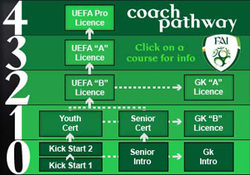
In per capita terms, England (one Pro licence per 263,515 pop. and one A licence per 46,000 pop.) does even worse against Spain (one Pro licence per 21,824 pop. and one A licence per 3,670 pop.) due to its higher population, but slightly better against Germany (one Pro licence per 80,523 pop. (at worst) and one A licence per 14,640 pop.).
Ireland is a relative newcomer to the international stage. Since 2007, the FAI has awarded 45 Pro licences (one per 100,000 pop. (approx.)). In 2010, there were 183 A licence holders and 488 holding the B licence.
Why is there such a large difference between the countries? One explanation could be the differences in cost of attaining such qualifications. The standard cost of the UEFA ‘A’ licence is €530 in Germany, €1,200 in Spain, €2,350 in Ireland and £4,390 in England. Attaining the ‘Pro’ licence can cost €7,550 in Ireland and £7,595 in England (figures should be treated with caution as they vary across sources). Also, the courses are relatively time consuming. Under the FAI’s programme, the Pro licence requires 250 contact hours over two years, while the A licence requires 270 contact hours. As well as this, lower coaching licences are pre-requisites for higher licences, so attaining a Pro licence can require a significant time and money outlay.
This leaves the question as to why Spain does so much better in terms of qualification attainment, even though attaining a Pro licence in Spain requires much more contact hours, 750 according to this article. Information is not readily available so I don’t have a definitive answer. Maybe costs are subsidised by local football clubs or local
authorities.
Is there a market failure in the top-level coaching market? This depends on the objective of the national football association and supporters. If it is qualification for the next major tournament, maybe this explains why managers get short-term contracts with relatively high salaries while youth coaching suffers. On the other hand, if the objective is the long-term success of the national team, then football associations may be better served by allocating a greater share of their revenue towards subsidising attainment of coaching qualifications. If they don’t, then like former baseball great Yogi Berra once said, it may be deja-vu all over again!
 RSS Feed
RSS Feed